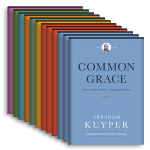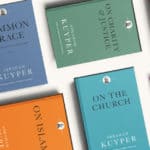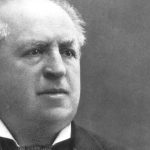
Last week, we announced a new series of translations of Abraham Kuyper?s writings in public theology. This monumental series is comprised of 8 key works across 12 volumes. While most of the translation has already been completed, producing these volumes will take some time. The first volume,?Our Program, will be released on November 10 and another volume should be finished before the end of the year. Our goal is to have all 12 volumes completed within two years.
To tide you over until the series is finished, we?ve prepared three excerpts from three forthcoming volumes to give you a preview of what?s on the horizon. If you?re not familiar with Kuyper?s writing or thought, these preview volumes are the perfect way to familiarize yourself with one of the most influential thinkers of the modern era.?And best of all,?we?re giving away these previews for free!
From On The Church

In his sermon Rooted & Grounded, Kuyper sought to address the challenging questions facing the church in the modern era: What exactly is the church and what is its place in society? The Church needs to be rooted?a living organism that grows freely. And the Church needs to be grounded?an institution with strong foundations to keep it from collapsing.
From the introduction of this volume:
In this address, Kuyper offered an ecclesiological paradigm to meet the exigencies of modern society. The church, he said, was at once an organism and an institution. As rooted, the church had an inner organic life that flowed directly from the Spirit of God. The way to understand this aspect of the church was the various biological metaphors used in Scripture, especially the church as a body. This would also explain the familial character of the church. Whatever disestablishment may signify, the church was not a mere club but made claims even upon those born into its bosom apart from any deliberate choice. Nevertheless, the life of the church was not to be taken for granted, as perhaps a national church was prone to do. It must be deliberately built. The church was not only a body but also a house, and as such it was founded and built by human hands. This building had a solid outward form that shaped and protected the inner organism. ?The church is called a multitude of priests, legitimated through birth but consecrated only through anointing,? he said.
From On Education

Scholarship contains two commencement addresses Kuyper gave to students at the Free University of Amsterdam, which he founded. These speeches present an introduction to Kuyper?s thoughts on education from a Christian perspective. Scholarly study is a calling meant to help us better know the Creator and his creation.
From the translator?s note for this volume:
These talks show Kuyper in two very special roles. He is the patient mentor who seeks to mobilize the younger generation of his constituency for the culture war of his time, and he is the devoted professor who identifies with his students and wants them to succeed. Acting in these roles, he treats weighty topics with a light touch and presents his sometimes surprising insights with incisive analysis sprinkled with humor and common sense. The two addresses can still inspire us today even as they must have inspired his audience over a century ago.
From Common Grace

In his seminal three-volume work,?Common Grace,?Kuyper presents a public theology of cultural engagement based on the common humanity shared by all. This grace of God encourages us to participate in the various areas of life, contributing to the flourishing of the created order. Science and art are two domains that are difficult to reconcile with God?s presence and grace. In Wisdom & Wonder, Kuyper presents a constructive framework for engaging these two domains.
From the foreword of this volume:
In Wisdom & Wonder, Kuyper addresses two of the more difficult realms that intimidate Christians in modern-day conversations: science and art.
Many Christians feel threatened by science, and believe it is not trustworthy and poses an affront to faith. Issues surrounding bioethics, evolution, environmental stewardship, and the probability of more scientific discovery through new technologies all cloud our objectivity about right and wrong, good and evil.
Art is another aspect in which Christians have an uneasy, ill-defined relationship. We live in a time when our imaginations are under assault, and creativity has become a casualty in many of our lives. We are not trained to recognize good art from poor and our patronage of good culture is being all but lost. Sadly, much of the art Christians do appreciate is classified as ?Christian art,? yet it does little to move us deeply. Kuyper comes alongside, helping us retrieve the notion that great art should not only touch our hearts but also engage our minds. If it fails to do so it is not artful.
Kuyper?s insistence that Jesus really is Lord of all bounces off the pages of this book. His conviction that science is not a threat to our faith, but an ally, and his exhortations to celebrate the glory of God through creative expression will joyfully cause many to add new words of praise to the Lord of both heaven and earth.
Introduce yourself to Kuyper?s thoughts on the church, education, and the common grace of cultural engagement with these three excerpts from the Abraham Kuyper Collected Works in Public Theology.





